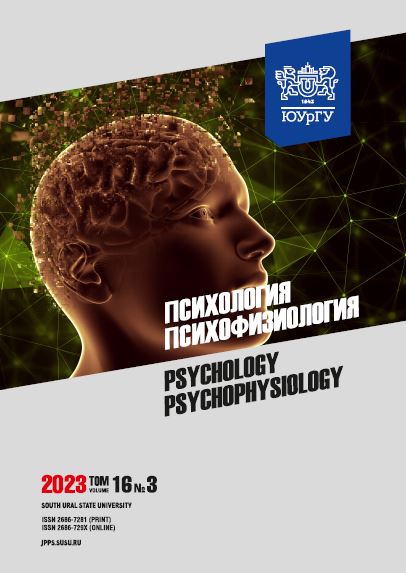The relationship between the motivations for education and resilience in students from different fields of study
Abstract
Introduction. The resilience of a student is conditioned by the formation of his or her professional competency. Aims. To identify the relationship between motivations for education and resilience in students from different fields of study. Materials and methods. The study involved 417 university students of both sexes with a mean age of 21.0 ± 1.1 years. The students represented the following fields of study: pedagogy, engineering, physical education and sport, and law. Their level of resilience and motivations for education were estimated simultaneously. Correlation analysis was performed with the SPSS Statistics v. 23 software. Results. The level of motivation for education is predetermined by the corresponding level of resilience. The higher the level of resilience, the higher the score of communicative, professional, and creative motivations. Motivations for prestige and social motivations are not associated with resilience in students. A relationship was found between the components of resilience and motivations for educational and professional activities in students with different levels of resilience. During the study period, motivations act as a functional system, the structure of which is determined and characterized by the components of resilience. The level of resilience in students is determined by the system “motivations for education – resilience”. A key, non-specific characteristic is the relationship between motivations for study and the awareness of life scale. Motivations for prestige and social motivations for study were found only in students with low levels of resilience. Conclusion. Professional and cognitive motivations, regardless of the field of study, are among the leading ones for the educational and professional activities of modern university students. The relationship between the parameters of resilience and motivations for education is mediated by the field of study and level of resilience. The prospects for further research have been identified.
Downloads
References
(in Russ.). DOI: 10.54884/S181570410020802-7.
2. Baiguzhin P.A. Hygienic estimation of intensity brainwork of students in the situation of testing of theoretical readiness. Vestnik Yuzhno-Uralskogo gosudarstvennogo universiteta. Seriya: Obrazovanie, zdravookhranenie, fizicheskaya kultura = Bulletin of South Ural State University. Series “Education, Healthcare, Physical Education. 2011;39(256):16–18. (in Russ.).
3. Morozyuk S.N., Gorbenko I.A., Kuznetsova E.S. The phenomenon of “viability” in senior schoolchildren and students in the conditions of modern education. Vestnik Universiteta Rossiiskoi akademii obrazovaniya = Herald of the university of the Russian academy of education. 2020;4:18–27.
(in Russ.). DOI: 10.24411/2072-5833-2020-10036
4. Khrokalau V.A., Sokolova A.A. Security of the individual, society and the state: the informational-psychological aspect. Vestnik Polesskogo gosudarstvennogo universiteta. Seriya obshchestvennykh i gumanitarnykh nauk = Bulletin of Polessky State University. Series in Social Sciences and Humanities. 2018;1:27–35. (in Russ.).
5. Zeer E.F. Social and psychological aspects of development of viability and formation of resilience of man. Pedagogicheskoe obrazovanie v Rossii = Pedagogical Education in Russia. 2015;8:69–76. (in Russ.).
6. Rylskaya E.A. Test “Human viability”: development and psychometric characteristics. Sotsium i vlast = Society and power. 2016;1(57):25–30. (in Russ.).
7. Selezneva N.T., Rublenko N.S., Todysheva T.Y. Zhiznesposobnost lichnosti [The vitality of the individual]. Krasnoyarsk: Publ. Krasnoyarsk General Pedagogical University named after S.P. Astafyev. 2015:308. (in Russ.).
8. Baidasheva E.N. Personal and professional education of students at the university. Sovremennye problemy nauki i obrazovaniya = Modern problems of science and education. 2006;1:34–35. (in Russ.).
9. Vetokhin S.S., Klimovich I.A. The results of a sociological study of the motives of educational and future professional activity of engineering students. Trudy Belorusskogo gosudarstvennogo tekhnologicheskogo universiteta. Seriya 8. Uchebno-metodicheskaya rabota = Proceedings of the Belarusian State Technological University. Series 8. Educational and methodical work. 2009;8:191–192. (in Russ.).
10. Gubanova A.V., Dmitrieva T.Yu. Motives of educational activity of physics students. Razvitie myshleniya v protsesse obucheniya fizike = Development of thinking in the process of teaching physics. 2013;1:22–25. (in Russ.).
11. Chirkina S.E. Motives of educational activity of a modern student. Obrazovanie i samorazvitie = Education and self-development. 2013;4(38):83–89. (in Russ.).
12. Akimenko G.V. Individual psychological features of students personality and motives of educational activity on the example of a medical university. Dnevnik nauki = Diary of Science. 2020;4(40):17. (in Russ.).
13. Sedova S.S., Lvova Yu.A. Study of the leading motives of students educational activity. Nauchnyi poisk: lichnost, obrazovanie, kultura = Scientific search: personality, education, culture. 2023;2:48–52. (in Russ.).
14. Afanasenkova E.L., Artyushkevich A.N. Motives of educational activity of university students of different professional directions in modern conditions of education. Novoe v psikhologo-pedagogicheskikh issledovaniyakh = New in psychological and pedagogical research. 2013;1(29):140–153. (in Russ.).
15. Matveeva S.L. Features of motives of educational activity at students of the state and private universities. Vestnik Kamskogo instituta gumanitarnykh i inzhenernykh tekhnologii = Bulletin KIGIT. 2019;1:83–96. (in Russ.).
16. Nalichaeva S.A., Dyachuk A.K. Resilience as a sustainability factor for manifestations оf disadaptation of youth. Institut psikhologii Rossiyskoy akademii nauk. Organizatsionnaya psikhologiya i psikhologiya truda = Institute of Psychology of the Russian Academy of Sciences. Organizational Psychology and Psychology of Labor. 2019;4(2):44–91. (in Russ.).
17. Badmaeva N.C. Metodika dlya diagnostiki uchebnoi motivatsii studentov [Methodology for the diagnosis of educational motivation of students]. Vliyanie motivatsionnogo faktora na razvitie umstvennykh sposobnostei [Influence of the motivational factor on the development of mental abilities]. Ulan-Ude. 2004:151–154. (in Russ.).
18. Egorova A.Yu., Bobryshov S.V. The system of motives of educational activity as a prognostic system success factors in learning: view through the prism of unificationnow approach. Vestnik Severo-Kavkazskogo federalnogo universiteta = Newsletter of North-Caucasus Federal University. 2020;3(78):148–157. DOI: 10.37493/2307-907X.2020.3.17. (in Russ.).
19. Bogomazova K.O., Baiguzhina O.V. Social anxiety and psychological climate as indicators of vitality in students of different education fields. Psikhologiya. Psikhofiziologiya = Psychology. Psychophysiology. 2022;15(1):5–15 (in Russ.) DOI: 10.14529/jpps220101
20. Mutalibov A.Sh., Atalaeva N.P.G., Abdulkerimova A.A., Ilyasov I.O. Management of the process of motives formation for educational activities. Izvestiya Dagestanskogo gosudarstvennogo pedagogicheskogo universiteta. Psikhologo-pedagogicheskie nauki = Dagestan State Pedagogical University. Journal. Psychological and Pedagogical Sciences. 2021;15(3):65–69. (in Russ.). DOI: 10.31161/1995-0675-2021-15-3-65-69
References on translit
-Copyright (c) 2023 Psychology. Psychophysiology

This work is licensed under a Creative Commons Attribution-NonCommercial-NoDerivatives 4.0 International License.



